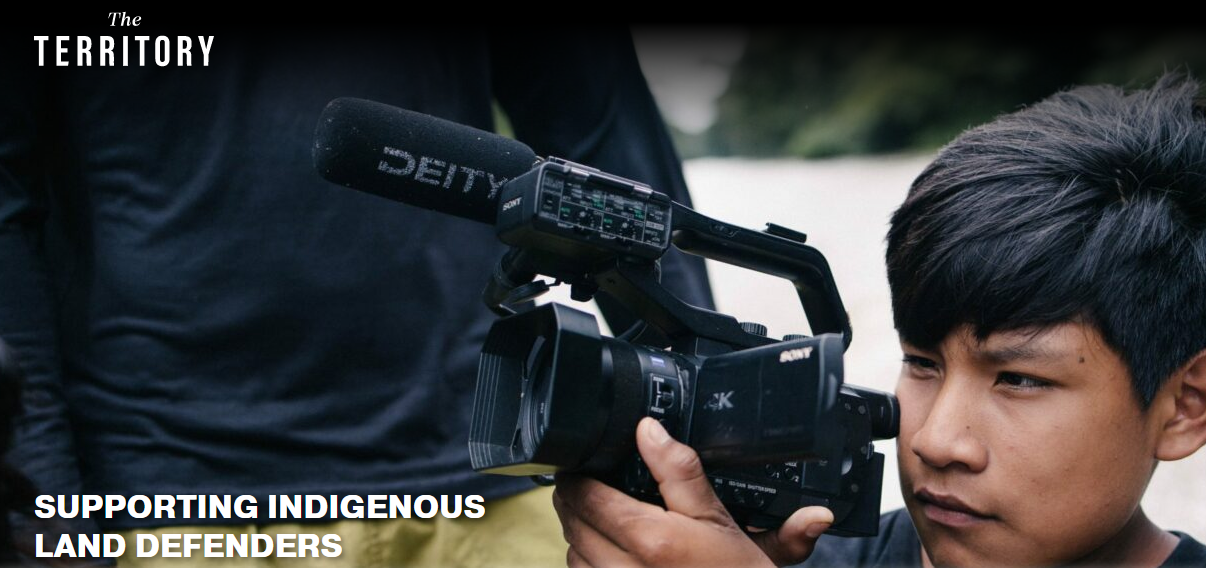Green Film Review: The Territory
Written by: Emilie Challinor, Green Film Committee Member
Recently the Green Film Festival screened The Territory, an urgent and visually stunning film which documents the fight of the Uru-eu-wau-wau people to defend their land against deforestation. The fewer than 200 Uru-eu-wau-wau defend a stretch of forest covering 7,000 square metres, threatened on all sides by encroaching farms and illegal loggers. Following environmental activist Neidinha as she works closely with the Uru-eu-wau-wau, the enormity of the threat to the forest and to the people working to defend it is unfolded through a storyline which slowly builds in its sense of urgency and excitement.
Beginning with a quiet oscillation between the worlds of the Uru-eu-wau-wau, the activists in the city, and the farmers and loggers on the edge of the territory, these clashing perspectives set up a complex and loaded problem. The loggers are set in their determination to clear the forest and despite expert organising on the part of the Uru-eu-wau-wau, the sheer size of the reserve means that responding to an illegal incursion involves a complex process from the tip-off through communications with Neidinha and agencies on the outside to the final response of the defence team who arrive at the site too late to catch anyone in the act.
Throughout, the camera pays exquisite attention to the forest, making it viscerally clear what is at stake in its destruction. Scenes open with close-ups on a frog, an insect, a raindrop as it slides off a leaf, and we hear the leaf-crackle and birdsong and the constant shifting and breathing of the living forest before the focus settles on a human moving through it. When this noise is broken by the harsh whir of a chainsaw, therefore, the injury feels more shocking and more personal since we have seen in detail what will be lost. These choices make the territory as much of a character in the film as the people who live in and around it. This heightens the sense of threat and loss as pressures accumulate at its boundaries.
A turning point in the film comes when, during the Covid pandemic, the Uru-eu-wau-wau take control of the cameras and film themselves. The pace of the film and the sense of action picks up as, under the leadership of Bitate, a young man who is elected leader of the defence team, they record increasingly successful responses to threats and incursions, successfully expelling loggers and destroying a house built illegally within the reserve. The use of drone technology and the work of their newly established media team provides greater sense of power and draws increasing attention nationally and internationally to their struggle. The film ends on a complex note with hope for the future in the growing power of the people to defend the forest, while remaining realistic about the scale of the threat from outside with the Bolsonaro government incredibly hostile and the need for national and international action to divest from deforestation.
Overall, the film was a vital insight into Uru-eu-wau-wau work as stewards of their territory which made the threat of deforestation immediate and personal.
The Discussion
Our discussion after the screening focused on the importance of indigenous people as the greatest experts on ecosystem management, conservation and the fight against ecological destruction while stressing the need to call on governments and businesses to support their action through legal protections and divestment from destructive supply chains.
The reality of defending indigenous reserves in the Amazon was something many of us do not know much about, so the film was a valuable insight. We talked about the possibility of hope after the recent election in Brazil and the new government’s commitment to decrease deforestation, but also the challenge of changing the actions of individual deforesters who see deforestation as the only route to a secure livelihood in the face of poverty. We also thought about who protects our local ecosystems, smaller in scale and global significance perhaps than the Uru-eu-wau-wau territory but still vital in terms of biodiversity and the potential to connect communities.
The film has an impact website, following up in support of the Uru-eu-wau-wau and agencies which work with indigenous people across the Amazon to defend the environment and their rights.
You can find it here: The Territory // Impact (theterritoryimpact.org)
You can also read about the film at: The Territory | National Geographic Documentary Films
Green Film Festival 2023
The film’s reception was noted and, with the recent elections in Brazil, The Territory has been earmarked for a repeat showing at the festival in 2023.
Block out your evenings across the 6th to 12th February 2023. The upcoming Green Film Festival promises to be worth your while.


